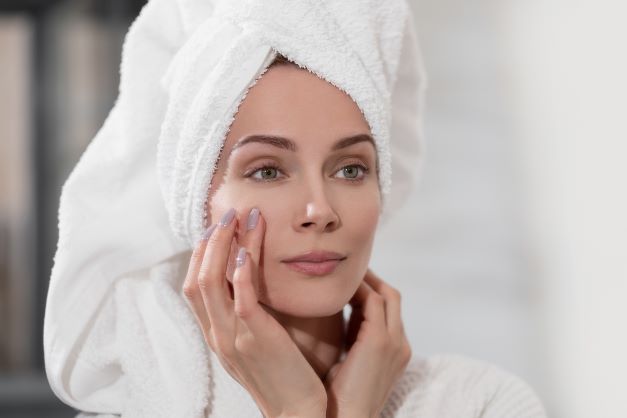Many people make their skin care choices based on the way their skin looks, but that’s only half the battle. According to Dr. Young McMahan of U.S. Dermatology Partners in Waco, Texas, “Skin texture may be overlooked as skin care routines tend to focus on changes in appearance such as discoloration and blemishes. Treatments to address skin health issues like acne, dark spots, and wrinkles or provide for other skin care needs may end up stripping the skin of moisture, leading to dryness, thickening of the skin, roughness, or sagging. If you’re unhappy with the way your skin feels, talk to your dermatologist about treatments and products that can deliver a smooth, healthy feeling skin as well as beautiful-looking skin.” In this blog, Dr. McMahan reviews three quick and easy ways to improve skin texture.
1 – Dermatologic Procedures to Improve Skin Texture
According to Dr. McMahan, “If you’re unhappy with your skin’s texture, the first step you should take is to call your dermatologist. During a one-on-one visit with your dermatologist, they can examine your skin and help you create a treatment plan that includes in-office treatments and at-home skin care products to deliver the desired results.” Some of the most recommended dermatologic procedures to improve skin texture include:
- Chemical peels – A chemical peel is recommended to remove the surface layer of skin, revealing healthier, smoother skin below. Chemical peels also encourage healthy skin cell turnover and the production of collagen.
- Microdermabrasion – Microdermabrasion, like chemical peels, removes the top layers of skin, revealing healthier skin below. Rather than using a chemical to achieve this result, microdermabrasion uses a high-velocity abrasive crystal spray or suction to gently remove dead skin cells.
- Microneedling – This procedure uses a state-of-the-art dermatologic device to create micro-injuries. As the body goes to work healing skin damage, old skin cells are removed, new skin cells emerge, and collagen and elastin production increases, leading to smoother, healthier skin.
- Laser skin resurfacing – This procedure is typically recommended to reduce the appearance of scars, wrinkles, enlarged pores, and other skin irregularities. It uses laser light beams to remove skin layers until the damaged or imperfect area of skin is removed.
2 – Skin Care Products to Improve Skin Texture
When it comes to at-home skin care to improve skin texture, Dr. McMahan says, “Again, your dermatologist is the best person to help you develop a customized, at-home skin care routine. Every person is different, and your skin care needs are not exactly like any other person’s even if you have the same overall goal to improve skin texture.” While each person should consult with a knowledgeable dermatologist about the right skin care products for their unique needs, some of the best products to address issues with skin texture include:
- Sunscreen – Daily sunscreen application is the most important element of just about every skin care routine. Sun exposure can cause numerous adverse effects, including leading to a dryer and less supple skin texture. Consult a dermatologist for specific product recommendations, but most people achieve the desired skin protection through the application of a broad spectrum (protecting from both UVA and UVB rays) sunscreen of SPF 30 or higher.
- Exfoliants – One of the main issues that have a negative impact on skin texture is a buildup of dead skin cells. Using a good exfoliant at least a few times a week is a great way to remove dead skin cells, expose healthy new skin, and promote faster cell turnover. There are two main types of exfoliants – physical and chemical. They both provide the same results, but physical exfoliants can lead to excessive irritation and inflammation, especially for those who have sensitive skin. Chemical exfoliants may be a better solution for more frequent use and for those who have sensitive skin.
- Vitamin C serums – Vitamin C is a powerful antioxidant. It protects skin from free radical damage that occurs due to exposure to the sun, chemicals, and other environmental pollutants and allergens. In addition to protecting skin, vitamin C also promotes skin brightness and reduces the appearance of fine lines, wrinkles, and dark spots.
- Vitamin A and retinols – Retinols and other skin care products that contain vitamin A are great for promoting healthy skin cell turnover and increasing the natural production of collagen and elastin. This improves skin texture issues like fine lines, wrinkles, sagging, scarring, and discoloration.
- Salicylic acid – If you have skin texture issues caused by clogged or enlarged pores, products that contain salicylic acid may be the best treatment option. They help to unclog pores and heal blemishes.
- Lactic acid – If you’re dealing with dry, thickened, or rough skin, products with lactic acid can help to soften and smooth skin. Specifically, using a moisturizer with lactic acid can help to soften and hydrate skin.
3 – Lifestyle Steps to Improve Skin Texture
In addition to procedures and products available from your dermatologist, Dr. McMahan recommends, “It’s important to consider the way your lifestyle impacts the health and appearance of your skin. Unnecessary stress, excessive sun exposure, and poor overall nutrition can all impact your skin.” To ensure your skin texture is even, keep the following lifestyle factors in mind:
- Eat right – While a direct link between diet and skin health is dubious at best, there’s no doubt that your body’s overall health is an important factor that impacts skin health. When the body has the right nutrients to perform its daily functions, your skin will receive the necessary nutrients to look and feel its best.
- Drink plenty of water – Like nutrition, drinking enough water to keep the body hydrated can be just as important to skin hydration as a good moisturizer.
- Sleep well – Our bodies heal and rejuvenate at the cellular level as we sleep, so getting plenty of rest ensures our skin cells are able to heal and repair themselves.
- Exercise – Exercise is good for overall health, improved circulation, and stress reduction. All of this means better skin health too.
- Minimize sun exposure – Every time skin is exposed to the sun’s UVA and UVB rays both short and long-term damage can be done to the skin. In the short term, you may experience a sunburn or tan. In the long term, sun damage can lead to dark spots, fine lines and wrinkles, and even skin cancer. It’s important to minimize sun exposure. If you do need to be out in the sun, make sure you are applying sunscreen regularly.
- Change habits – Smoking, using other tobacco products, and drinking excessively are all factors that negatively impact overall health, which can leave skin looking and feeling uneven and unhealthy.
- Maintain your skin care routine – Make sure to create a good skin care routine for the morning and evening and stick with it. Consistent care is often the best way to keep skin looking and feeling its best.
Ready to Work with a Dermatologist?
At U.S. Dermatology Partners, our knowledgeable dermatologists can help you improve any aspect of your skin’s health or appearance. When you’re ready to take steps toward looking and feeling your best, you can get started any time by using our simple online form to request an appointment in a U.S. Dermatology Partners location near you. Once we receive your request, a member of our team will be in touch to finalize the details and answer any questions you may have.
Find a location near me
or


